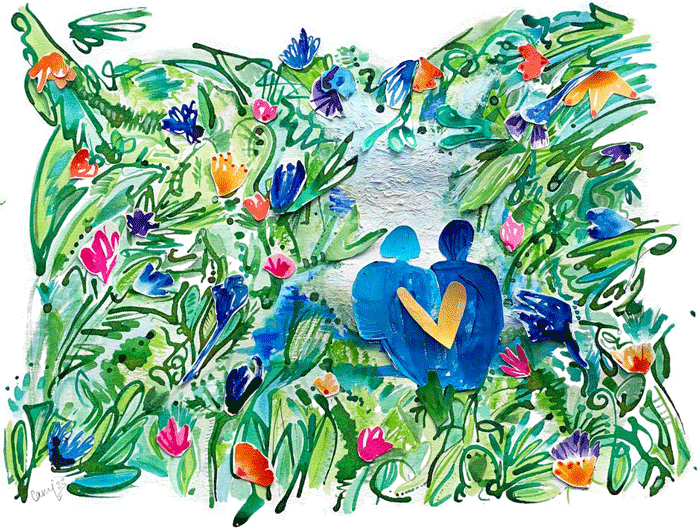All About Plants – RHS Chelsea 2024
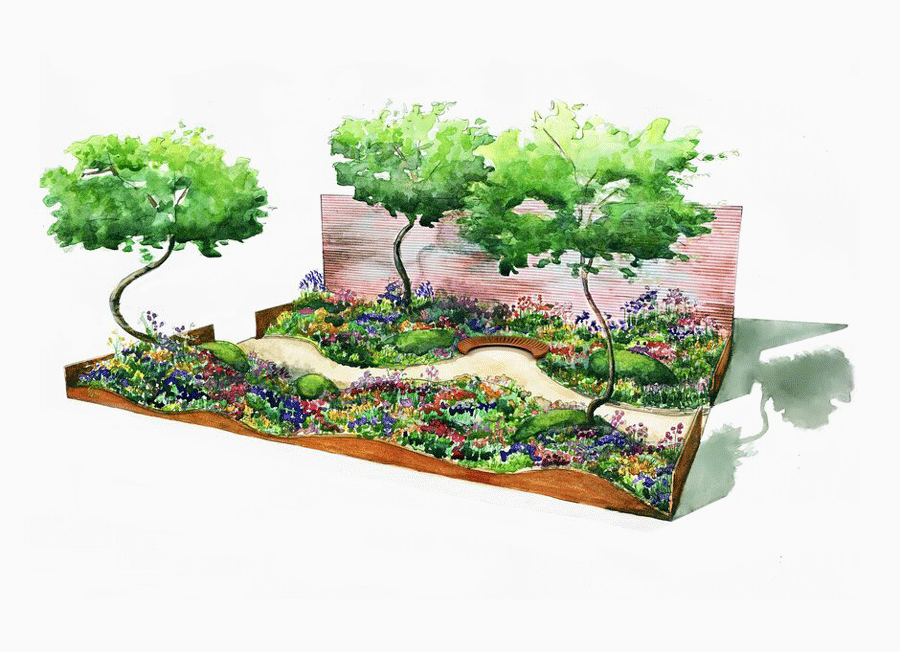 From diversity of life in tropical forests to an edible skatepark landscape, the All About Plants category at the 2024 RHS Chelsea Flower Show will highlight health, joy and inspiration in a variety of designs, highlighted below.
From diversity of life in tropical forests to an edible skatepark landscape, the All About Plants category at the 2024 RHS Chelsea Flower Show will highlight health, joy and inspiration in a variety of designs, highlighted below.
The Panathlon Joy Garden
Designed by Penelope Walker and sponsored by Project Giving Back supporting The Panathlon Foundation, this garden promises a colourful and uplifting depiction of Panathlon’s objectives; to inspire inclusivity and empowerment, enable accessibility and create confidence.(pictured banner above ©Penelope Walker).
A harmonious balanced space with playful and unique features bringing magic and surprise. The curved tree stems of the Platanus x hispanica ‘Malburg’ symbolise Panatholon’s objective to normalise difference. The garden features a diverse combination of plants with pollinators in mind and ornamental grasses for shelter for insects.
The unusual tree shapes symbolise normalising difference; they may look different from the ‘norm’ but this does not impact their ability to function and perform perfectly well and still exude beauty. Planting ensures all garden visitors, irrespective of ability or age, connect to the plants, with a better sight line for wheelchair users. Geranium ‘Anne Thomson’; Salvia ‘Neon’ and Heuchera ‘Midnight Rose’ feature.
After the show the garden is being relocated to the Majorie McClure school in Bromley, South London.
The Size of Wales Garden
Sponsored by Project Giving Back supporting The Size of Wales, this garden designed by Daniel Bristow, is inspired by the abundance and diversity of life that occurs in tropical forests and the work the Size of Wales are doing to prevent the tragedy of its destruction.
A total of 313 Plant species have been used, reflecting the number of tree species that can occur in just one hectare of tropical forest with Alpine miniature marvels among the rocks. The garden also features a fungus fence, revealing the hidden kingdom of fungi, vital to the health of every forest in the world.
Look out for the fluffy pom-pom seed heads of Dryas octopetala, moss-like carrot relative Azorella trifurcate and the eyeballed pincushions of Leptinella ‘County Park’. After the show the garden will live on and mature at Treborth Botanical Garden, North Wales.
The Planet Good Earth Garden
This garden is an edible skatepark landscape inspired by the joy of playing. It is designed by Betongpark and Urban Organic and sponsored by Project Giving Back supporting The Planet Good Earth CIC. Planet Good Earth is a fun food education programme that inspires the next generation to be part of the environmental movement. The design uses multi-layered planting integrated into the space under the canopy of a forest landscape with planting illustrating a natural forest ecosystem that supports a wide range of flora and fauna.
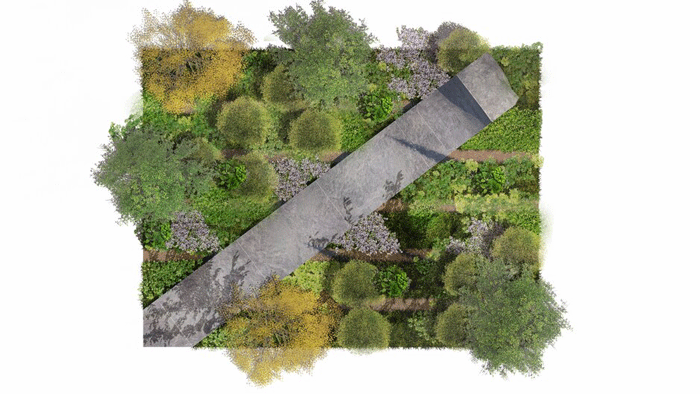 Image: ©Betongpark & Urban Organic
Image: ©Betongpark & Urban Organic
The garden features native and exotic species in a forest garden theme and includes culinary and medicinal herbs with a canopy layer including apple and pear trees. After the show the garden is being relocated to the Black Mountains College near Hay on Wye.
Sue Ryder Grief Kind Garden
Designed by Katherine Holland and sponsored by Project Giving Back supporting Sue Ryder, this garden provides a safe and peaceful sanctuary within the beauty of nature while sharing experiences or having a moment of quiet reflection. Plants have been chosen for their sensory properties and have been layered throughout the garden to connect people to the space. The space accommodates varying mobility needs and the sightlines from beds and chairs have been factored into the heights for each area of the garden.
The garden features a warm but subtle colour palette, underpinned by soothing greens and greys. Look out for the unusual tree species including Frangula alnus ‘Aspleniifolia’ with its filigree lace foliage.
After the show the garden is being relocated in its entirety to the Sue Ryder St John’s Hospice, Bedford.
The Bowel Research UK Microbiome Garden
This garden takes inspiration from human cultures that have tended thriving ecosystems for their nourishment and focuses on health, for people, plants and all life. Thoughtful edible plantings feature with the look of the planting reflecting an awe-inspiring natural landscape. The edible meadow counters the harmful effects of our current food system on the environment, fostering both biodiversity and nourishment.
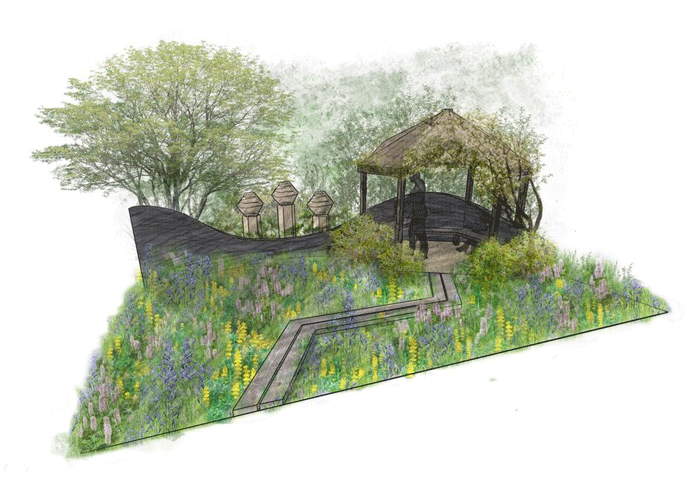 Image: ©Chris Hull and Sid Hill
Image: ©Chris Hull and Sid Hill
The garden is designed by Chris Hull and Sid Hill and sponsored by Project Giving Back supporting the Bowel Research UK charity. Planting is a designed plant community based on layering of plants which have been selected for their ecological role in the planting. There is a green groundcover matrix of grasses to knit the design together and the three theme plants offer the main colour pallet of yellow, blue and pink: Bistorta officinalis pale pink bottle-brush flowers grow on leafless stalks while Camassia provides contrast with its vivid blue flower spikes.
The garden will be relocated to the Apricot Centre in Totnes, Devon, which runs a sustainable farm helping children and families understand the links between the wellbeing of the soil, food and habitat and the mental and physical helath of the people who work around the farm.
The Pulp Friction – Growing Skills Garden
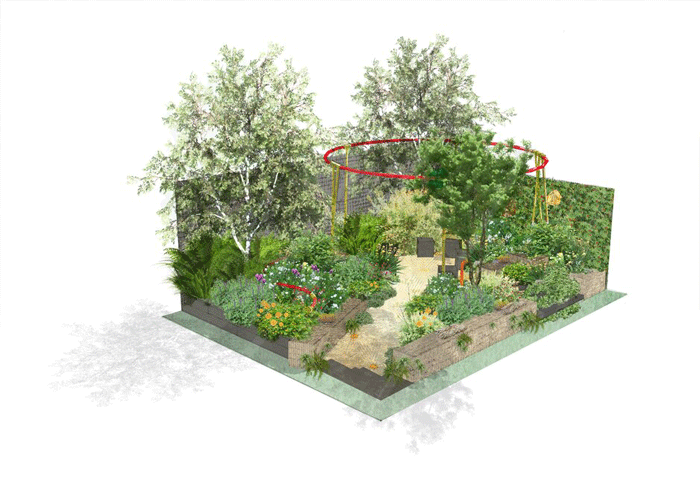 Image: ©Will Dutch & Tin-Tin Azure-Marxen
Image: ©Will Dutch & Tin-Tin Azure-Marxen
This garden, designed by Will Dutch & Tin-Tin Azure-Marxen, Dutch Landscape Architects Ltd., is another garden sponsored by Project Giving Back. It is inspired by the smoothie bikes that founded Pulp Friction, the garden is formed around centrifugal forces with colours and textures of edible planting spread throughout the garden.
The forest garden takes as its model the most productive organic system in Britain – the deciduous woodland and consists of trees and shrubs, with bushes below and a ground layer of perennial with self-seeding plants. Colours, textures and densities of planting have been spread throughout the design as if they had been spun out from the centre.
After the show the garden relocates to Bestwood, Nottingham, to be used as a community garden.

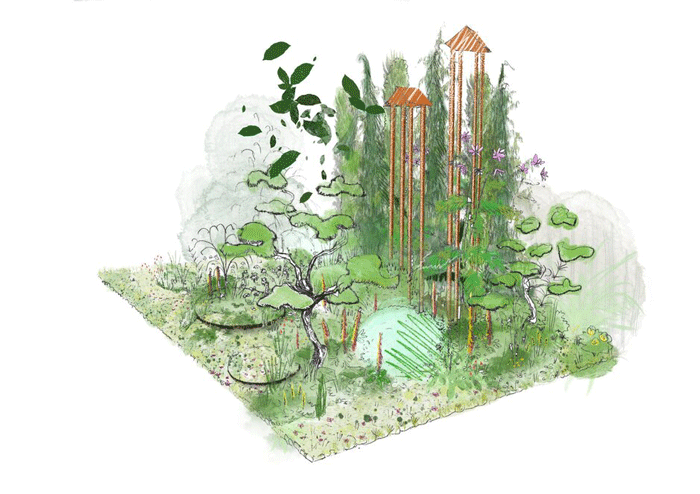 Image: ©Daniel Bristow
Image: ©Daniel Bristow